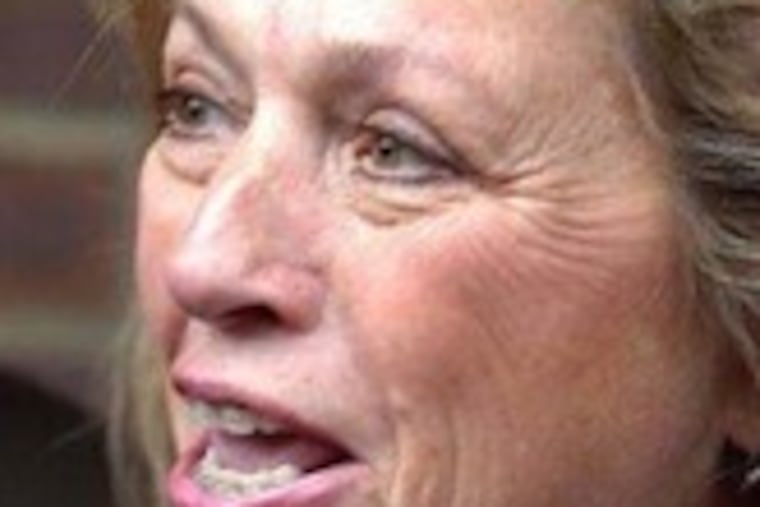
It was a tale of political and high-society intrigue: secret FBI recordings, a romantic rendezvous, a lie-detector test, a cover-up, a $2 million sweetheart loan from a du Pont, assorted low-grade corruption - all focused on a lady who was once one of the state's more powerful figures.
The evidence even included a hot tub and lipstick.
But the case against Sherry Freebery - so salacious and so politically incestuous in her native Delaware that next Monday's scheduled trial had been moved to Philadelphia - concluded with an unexpected whimper yesterday.
Freebery entered a surprise guilty plea during a 15-minute hearing at the U.S. Courthouse in Center City. Federal prosecutors dropped racketeering charges, allegations that she misused for political and personal purposes her office as New Castle County's No. 2 official. In return, Freebery pleaded guilty to making a false statement on a $200,000 bank loan application.
U.S. District Judge John Fullam set sentencing for Sept. 10. Under the advisory federal sentencing guidelines, Freebery could receive a sentence as low as probation or as high as about 18 months. A key factor will be the amount of intended or actual loss to the bank on the loan.
Freebery's plea came days before trial and about a week after Fullam indicated that he would not allow prosecutors to present evidence that Freebery coerced county employees to participate in campaign activities. Fullam had already dismissed large chunks of the government's case, and federal prosecutors had unsuccessfully sought to remove him, saying he wouldn't give them a fair trial.
U.S. Attorney Colm F. Connolly said the plea agreement was "driven by the court's pretrial rulings." But he added: "Ms. Freebery leaves court today as a convicted felon and all of the shame and consequences that that status entails."
Freebery's lawyers, William Taylor and Elizabeth Taylor, declined to comment. In a statement, Freebery said: "Today is indeed bittersweet, but I can honestly say that I feel relaxed for the first time in years and I look forward to starting my life again."
Freebery, 54, is a lawyer and a former high-ranking police officer. She was the chief administrative officer to New Castle County Executive Tom Gordon from 1997 through 2004. According to court documents, the two were also romantically linked for a time. Both are Democrats.
Gordon still faces racketeering charges. No trial date has been set.
New Castle County is the largest and most politically significant of Delaware's three counties, and the scandal had been closely followed in state political and legal circles for at least five years.
"This is probably the biggest political corruption prosecution in Delaware history," said Richard Abbott, a former New Castle County councilman, who said Freebery's illegal campaign activities in 2002 cost him his seat by just nine votes. Abbott, a Republican and avowed Freebery/Gordon enemy, had planned to attend Monday's trial.
Abbott said Freebery had been among the most powerful officials in the state, adding: "She wielded that power frequently - and mercilessly."
When Connolly announced the indictment in 2004, he said that "Gordon and Freebery co-opted the county government and turned a public entity into an instrument of private and political benefit."
The government alleged that she used on-duty police officers to work on political campaigns. In one instance, the government said, she diverted officers from executing a search warrant in a drug case to make campaign phone calls.
Freebery was also accused of covering up a $2 million loan from Lisa Dean Mosely, a du Pont family member who was developing a golf course called Fieldstone, a project for which Freebery allegedly expedited a certificate of occupancy. Freebery was also alleged to have spent $30,000 in public funds to hire lawyers to thwart a newspaper investigation of her role in the deal.
Gordon and Freebery were also accused of settling a sexual harassment claim made by one county employee against another for $260,000 because the complaining employee had threatened to expose an alleged romantic relationship between Gordon and Freebery.
Federal authorities later detailed other alleged misdeeds. They said Freebery bought a hot tub with county money and used county employees to perform personal services, including paying her bills, cleaning her house, and buying lipstick.
Soon after the indictment, Freebery held a news conference and released the results of her own polygraph test, which she said she passed.
In her statement yesterday, Freebery said that she "took responsibility" for not disclosing to the bank that she had signed a promissory note for the Mosley loan. "Both Lisa and I knew that she would never demand repayment and she has recently forgiven the note entirely." Freebery said the bank loan has been paid off "in its entirety."
The trial was moved to Philadelphia in 2005 after all four federal judges in Delaware recused themselves, in part because one of them was a potential witness in the case. The trial would have been heard by a jury of eastern Pennsylvanians.